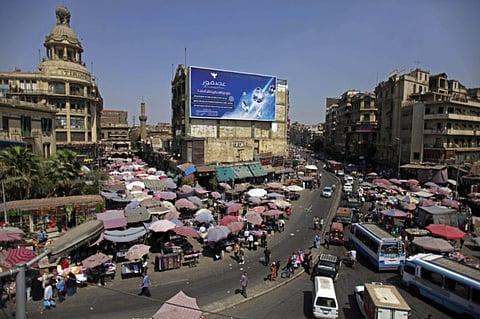Egypt plans new stimulus package worth billions of dollars in early 2014
Nation’s government works to give people jobs and put money in their pockets during a tough political transition

Cairo: Egypt plans a second stimulus package worth billions of dollars early next year, its trade and industry minister said, as the government works to give people jobs and put money in their pockets during a tough political transition.
The package will likely be equal to or larger than a 22.3 billion Egyptian pound (Dh11.8 billion, $3.2 billion) package announced in August, trade minister Mounir Fakhry Abdul Nour told Reuters in an interview on Wednesday.
His comments came hours before the United States halted some aid to the army-backed transitional government following a crackdown on the Muslim Brotherhood, a move that Cairo sharply criticised.
The government is preparing for parliamentary and presidential elections next year.
Egypt’s economy, crippled by social and political turmoil since Hosni Mubarak was ousted as president in early 2011, has been supported in recent months by funding from several Gulf Arab states.
Saudi Arabia, Kuwait and the UAE promised a combined $12 billion in loans, grants and fuel shipments after the army deposed Islamist President Mohammad Mursi in July following mass protests against his Brotherhood-dominated rule.
Unbearable subsidies
Abdul Nour did not say how the new stimulus would be funded.
But he said the government was determined to cut its “unbearable” subsidies bill and was discussing the issue with industrial representatives, without giving more details.
Gulf states have indicated they are prepared send Egypt even more aid in the coming months.
Many of Egypt’s 85 million citizens are highly dependent on energy subsidies, and despite a widening budget deficit the government has preferred to postpone unpopular austerity measures until an elected successor administration is in place.
Overall, food and energy subsidies account for a quarter of all state spending.
Abdul Nour said the interim government would “take the first steps to reduce the subsidy bill,” declining to say if fuel prices would be raised before or after the elections.
Infrastructure projects
“All sectors will be involved. We have a continuous dialogue with the producers, whether through the federation of industries or whether through the boards of the industrial zones,” he said.
The cabinet approved a 22.3 billion Egyptian pound stimulus package in August, mainly for infrastructure projects, to boost the economy during the political transition.
“God willing, it will be followed by another tranche, probably next January or February, probably equal to or a bit more,” Abdul Nour said.
It would depend on circumstances which projects would benefit from the second tranche, he said, without adding details.
Egypt has long grappled to reduce the cost of its energy subsidies, which have turned it from a net energy exporter into a net importer over the last few years.
“Egypt is subsidising its energy to the level of 140 billion Egyptian pounds, and it is a very, very heavy burden in the Egyptian budget and it is unbearable,” the minister said.
Sign up for the Daily Briefing
Get the latest news and updates straight to your inbox


